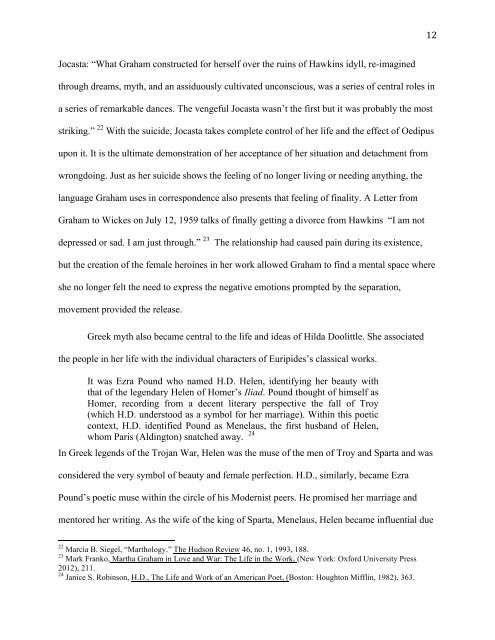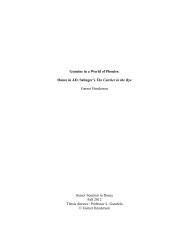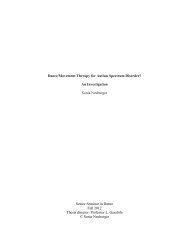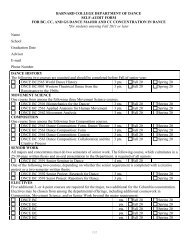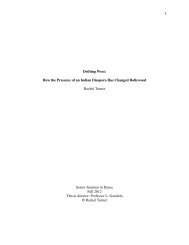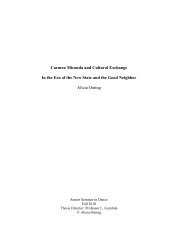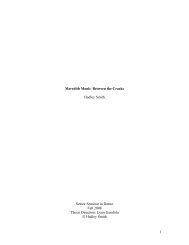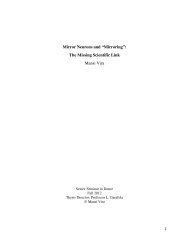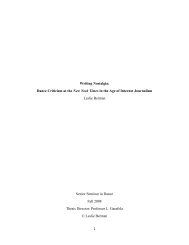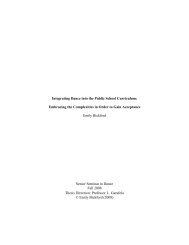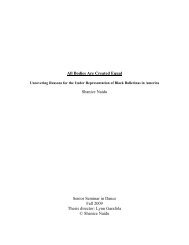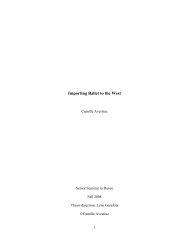Create successful ePaper yourself
Turn your PDF publications into a flip-book with our unique Google optimized e-Paper software.
Jocasta: “What Graham constructed for herself over the ruins of Hawkins idyll, re-imagined<br />
through dreams, myth, and an assiduously cultivated unconscious, was a series of central roles in<br />
a series of remarkable dances. The vengeful Jocasta wasn’t the first but it was probably the most<br />
striking.” 22 With the suicide, Jocasta takes complete control of her life and the effect of Oedipus<br />
upon it. It is the ultimate demonstration of her acceptance of her situation and detachment from<br />
wrongdoing. Just as her suicide shows the feeling of no longer living or needing anything, the<br />
language Graham uses in correspondence also presents that feeling of finality. A Letter from<br />
Graham to Wickes on July 12, 1959 talks of finally getting a divorce from Hawkins “I am not<br />
depressed or sad. I am just through.” 23 The relationship had caused pain during its existence,<br />
but the creation of the female heroines in her work allowed Graham to find a mental space where<br />
she no longer felt the need to express the negative emotions prompted by the separation,<br />
movement provided the release.<br />
Greek myth also became central to the life and ideas of Hilda Doolittle. She associated<br />
the people in her life with the individual characters of Euripides’s classical works.<br />
It was Ezra Pound who named H.D. Helen, identifying her beauty with<br />
that of the legendary Helen of Homer’s Iliad. Pound thought of himself as<br />
Homer, recording from a decent literary perspective the fall of Troy<br />
(which H.D. understood as a symbol for her marriage). Within this poetic<br />
context, H.D. identified Pound as Menelaus, the first husband of Helen,<br />
whom Paris (Aldington) snatched away. 24<br />
In Greek legends of the Trojan War, Helen was the muse of the men of Troy and Sparta and was<br />
considered the very symbol of beauty and female perfection. H.D., similarly, became Ezra<br />
Pound’s poetic muse within the circle of his Modernist peers. He promised her marriage and<br />
mentored her writing. As the wife of the king of Sparta, Menelaus, Helen became influential due<br />
22<br />
Marcia B. Siegel, “Marthology.” The Hudson Review 46, no. 1, 1993, 188.<br />
23<br />
Mark Franko, Martha Graham in Love and War: The Life in the Work, (New York: Oxford University Press<br />
2012), 211.<br />
24<br />
Janice S. Robinson, H.D., The Life and Work of an American Poet, (Boston: Houghton Mifflin, 1982), 363.<br />
12


